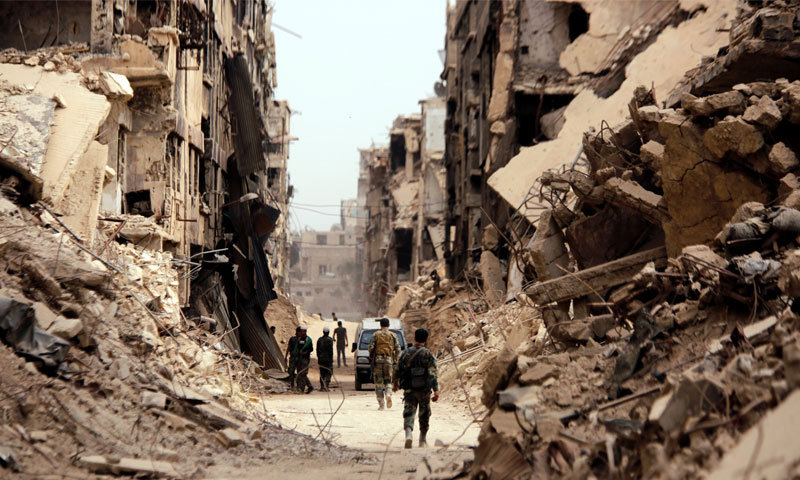



Syria’s internally displaced people (IDPs) and refugees face legal and judicial challenges after returning to their original destroyed areas in Syria, which they were forced to leave.These challenges result from property-related laws and decrees that negatively affect the proof of ownership of displaced persons to their houses and lands, amid the destruction or loss of legally recognized property rights documents.
The “Free Syrian Lawyers” organization supported by the “EuroMed Rights” organization is coordinating awareness-raising workshops on property rights for the Syrian community in Turkey.
The workshops project enables the classes affected by these laws, mainly residents of informal housing areas and women, to understand these risks and challenges and educate them on how to protect their property from violations.
The workshops include legal recommendations and methods that safeguard property rights and help the restitution of real estate confiscated unlawfully without compensation for the damages.
The Syrian Personal Status Laws affect the property rights of Syrian women and their children in the families who lost their main breadwinner who is the original owner of a house or land title.
Syrian women often do not have property titles registered in their names, for reasons that are due to social norms that prevent women from claiming property ownership.
Moreover, about 85 percent of Syrian IDPs and refugees have real property in the areas they have been forcibly displaced from.
The awareness-raising workshops’ project of the “Free Syrian Lawyers” organization, “The Restitution of Property for Syrian IDPs and refugees,” occurs in several Turkish cities, such as Antakya and Mersin, until the end of the current year.
The project’s workshops emphasized the need for Syrians, whether internally displaced or refugees in neighboring countries, Europe or other places, to defend their property rights through the provision of relevant documents.
The workshops also called on the affected people to submit their objections to any regulatory plan that would infringe on their property rights.
In an interview with Enab Baladi, the Head of the “Free Syrian Lawyers” organization, Ghazwan Koronfol, said that to protect the displaced Syrians’ property rights, people affected by the reconstruction plans of the destroyed areas must obtain any copy of a document or property title proving their ownership to the property, even if they were not residents of these areas.
The “Free Syrian Lawyers” organization established an online platform to document the real estate ownership in different areas of the Syrian conflict and record the kind of violation that the property was exposed to as a result of the conflict.
According to Koronfol, the online platform provides the necessary attention and confidentiality during the documentation process.
He said, “the “Free Syrian Lawyers” organization is legally responsible for the documentation process, which would be presented to one of the international bodies once it becomes ready and available.”
“These property documents would be handed over to the future transitional authority entrusted with the consideration and adjudication of property rights disputes,” according to Koronfol.
Syrian women face challenges in housing and land rights even before 2011, according to Koronfol.
He added, the conflict in Syria has increased the extent of these challenges, due to the low proportion of property registered in women’s names, as the percentage only reaches 5 percent of the overall registered properties in Syria.
According to Koronfol, this low proportion is due to social traditions and norms in Syria. For example, many women have little or no right to inherit their families’ property or were exploited by their husbands.
Other cases are when the husband (the owner of the property) dies, gets killed, abducted, or detained.
Forcibly displaced women from the areas previously besieged by the Syrian regime are considered among the most affected groups by real estate laws.
Koronfol pointed out that many of these women have unregistered marriage and childbirth documents that are not recognized by the state when the husband is either dead, missing, or detained.
In this case, there is no legal association between the wife and the husband to prove the legitimacy of her inheritance from him, according to Koronfol.
Most often, displaced women lack the necessary documentation to claim their property rights, such as a husband’s death certificate or a binding marriage contract for the determination of inheritance based on Islamic sharia and the Syrian Law.
The “Free Syrian Lawyers” project aims to raise women’s awareness on protecting their property by drawing their attention to the importance of legally documenting civil transactions, such as marriage contracts, childbirth, and death certificates to protect theirs and their children’s rights.
Koronfol stressed that the essential measure that women should be aware of is registering the death of the property owner on time in the Civil Affairs Directorate (the civil registry office where the deceased’s childbirth certificate is registered) in Syria.
A copy of the death certificate issued by the directorate is then taken to court to conduct the determination of heirs to the property owned by the deceased under the Islamic Sharia or the Syrian Law for private or state-owned properties.
According to Koronfol, this procedure can be done through a family member (heirs or first-class relatives) or a legal agent.
The final recommendations and outcomes of this project would be formulated after the conclusion of its events and the discussion of the participants’ impressions and views.
These recommendations and outcomes would be announced as the end product of this project, according to Koronfol.
if you think the article contain wrong information or you have additional details Send Correction